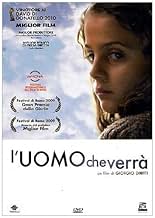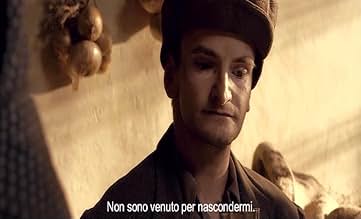NOTE IMDb
7,4/10
1,8 k
MA NOTE
Ajouter une intrigue dans votre langueIn the winter of 1943 a young girl named Martina stays silent following the death of her brother several years before. Her mother's pregnancy gives her hope, but as her brother is born the N... Tout lireIn the winter of 1943 a young girl named Martina stays silent following the death of her brother several years before. Her mother's pregnancy gives her hope, but as her brother is born the Nazis begin rounding up civilians.In the winter of 1943 a young girl named Martina stays silent following the death of her brother several years before. Her mother's pregnancy gives her hope, but as her brother is born the Nazis begin rounding up civilians.
- Réalisation
- Scénario
- Casting principal
- Récompenses
- 20 victoires et 25 nominations au total
Vito
- Signor Bugamelli
- (as Stefano 'Vito' Bicocchi)
Avis à la une
I just needed to write a direct answer to the review of "sfviewer123" - "Old wine new bottles" who voted 4.0 and claims about some stereotypization of the historical complexity.
Please disregard that review.
I can tell you that I grew up in the same region were the facts of this film are based, I read the historical documents, I watched the interviews of the survivals. My grandpa was hiding from the fascist forces in those years. This films captures to a true depth the reality of that conflict form the perspective of the innocent population. It is a unique gem in it's genre and it is historically very accurate of the events of the Marzabotto massacre.
I can tell you that I grew up in the same region were the facts of this film are based, I read the historical documents, I watched the interviews of the survivals. My grandpa was hiding from the fascist forces in those years. This films captures to a true depth the reality of that conflict form the perspective of the innocent population. It is a unique gem in it's genre and it is historically very accurate of the events of the Marzabotto massacre.
This a very moving film. Very beaitifull cinematography and authentic natural acting.
I was moved by the acting of the children and especially the little girl who plays the main character. The story is similar to what happened to the French village Ouradour sur Glane and many other villages where the nazis performed similar atrocities. A film to watch by future generations so that we never forget and always remember.
"The Man Who Will Come" is a drama set in an Italian's region, the Romagna (and not the Tuscany, although many shots come from there), during the II world war. The movie tells an interesting and cruel episode of the passing of the front in Italy: the Slaughter of Marzabotto, a dreadful tragedy, which becomes greater because of the number of children involved (more than two hundreds less-twelve-years-old children). This is the reason for the title, something like a dedication of the movie to children ("The Man Who Will Come" is a baby who survives to tragedy, he represents the generations of tomorrow), and in order to make stronger this connection history-childhood, a female child who doesn't speak is the protagonist of the movie. Director's aims, when he decides to coming this project, as he said recently, were two: to bring the spectator in a time travel, in a reality unknown for many people, and to narrate the war from the child's point of view. Probably, with this movie he reached to bring the spectator in the past (the choice to use the dialect, as Visconti's La Terra Trema, gives more realism to the narration, and makes the movie more eclectic than the others with the same themes; the care for details, from the lights to the clothes, is almost obsessive) but I think the point of view of the young female is just a little part of the movie: final point of view is quite objective, because there are many points of view, and this gives the taste of a good historical reconstruction. To say that this movie shows the war from the child's point of view is probably reductive, or just wrong: a movie which shows the point of view of a child in some historical period is very different from this work. Result? Nice job, but it's impossible to have an historical reconstruction of facts through a subjective point of view or, if it's possible, this movie couldn't reach it.
It's Dec 1943 in rural Italy. Martina is a young girl who has stopped talking. The other kids pick on her. Her mother is pregnant after the lost of her baby brother. Her family works the family farm living under the Nazi occupation. Some of the villagers support the Partisans led by Wolf. The fighting between the Partisans and the Nazis escalate. The Germans round up the locals and massacre them. Martina survives the mass killings and find her newborn brother as the historical event takes place.
This takes a lesser known story, outside of Italy, and brings it onto the big screen from the point of view of a child. It is beautifully shot. The story meanders early on but the little girl is compelling enough to keep it interesting. The massacre itself is a rolling train of horrifying events. It's important to tell the tale and this does a good job doing it with beauty and sincerity.
This takes a lesser known story, outside of Italy, and brings it onto the big screen from the point of view of a child. It is beautifully shot. The story meanders early on but the little girl is compelling enough to keep it interesting. The massacre itself is a rolling train of horrifying events. It's important to tell the tale and this does a good job doing it with beauty and sincerity.
This movie is mostly seen through the eyes of the young girl, Martina, who along with the other children provides a depth of innocence which is the counterpoint to the ice-cold brutality of an invading army. The various viewpoints and behaviour of the diverse groups: villagers - old and young; partisans living in the woods;the clergy; the invading forces with their various levels of humanity from ruthless soldiers whose souls are dead to those who can't help but feel compassion for the people they are invading, never seem clichéd even though they may be in so many war movies. This is simply humanity at war, portrayed clearly and credibly without the slightest pretence. The cinematography, direction and acting are supremely natural, creating a fine, memorable movie.
Le saviez-vous
- GaffesThere is a scene of partisans walking through the snow at around 26:30. There are four shots in total, with three shots (1st, 2nd and 4th) showing seven partisans, and the other (3third shot showing nine partisans.
Meilleurs choix
Connectez-vous pour évaluer et suivre la liste de favoris afin de recevoir des recommandations personnalisées
- How long is The Man Who Will Come?Alimenté par Alexa
Détails
- Date de sortie
- Pays d’origine
- Sites officiels
- Langues
- Aussi connu sous le nom de
- L'uomo che verrà
- Lieux de tournage
- Castel San Pietro Terme, Bologne, Émilie-Romagne, Italie(exterior scenes)
- Sociétés de production
- Voir plus de crédits d'entreprise sur IMDbPro
Box-office
- Budget
- 3 000 000 € (estimé)
- Montant brut mondial
- 3 034 481 $US
- Durée
- 1h 55min(115 min)
- Couleur
- Rapport de forme
- 2.35 : 1
Contribuer à cette page
Suggérer une modification ou ajouter du contenu manquant


























